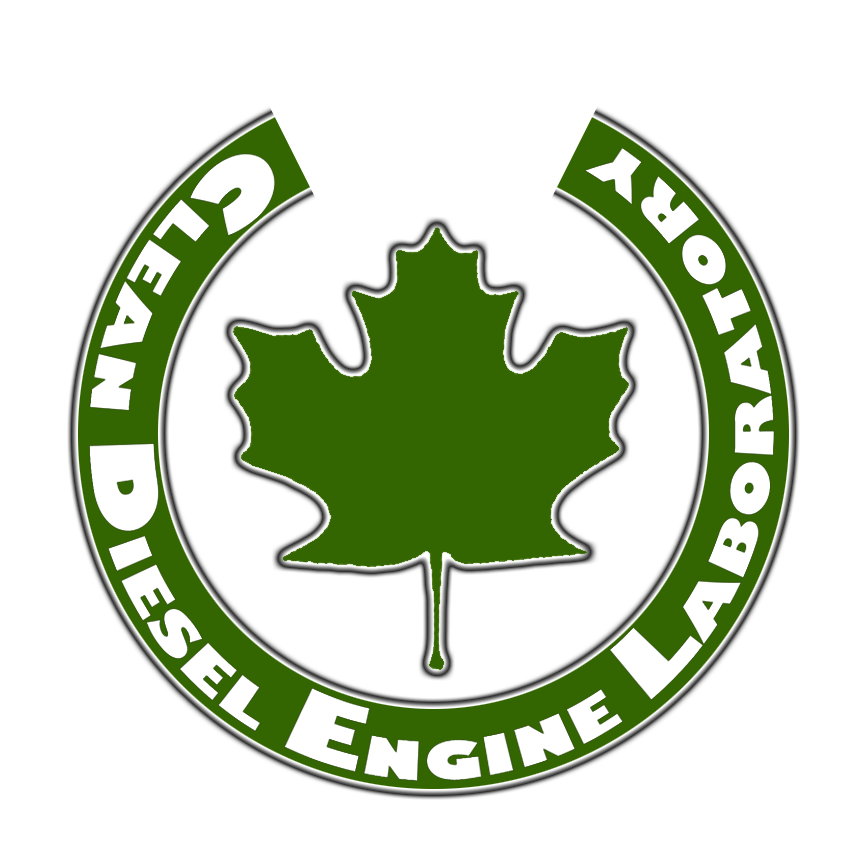|
Visit our New Site and Updated Contents Dr Zheng and Dr Reader have co-founded the state-of-the-art Clean Diesel Engine Laboratory (CDL) at the University of Windsor. The laboratory has engaged fundamental clean diesel research activities in combustion, diagnostics, and modeling with the support from governments since 2003. The laboratory has further established a number of innovative research projects with significant funds and in-kinds from Ford Motor Company, International Truck and Engine Company, Imperial Oil, and other worldwide collaborators. Since year 2003, the clean diesel research group has received 2.6 million dollar cash awards and approximately 2.1 million dollar in-kind contribution from governmental, industrial, and academic institutions. The research targets to improve the diesel combustion process and to reduce the exhaust emissions.
|
|
|
Clean Diesel Laboratory (Click the orange letters for details)
Clean Diesel Engine Research Laboratory supported by
|
Contents Technologies Publications
|
|
The Clean Diesel research group invites qualified applicants for NSERC Undergraduate/Graduate Scholarship and Postdoctoral Fellowship related to research themes below. Openings for Graduate students in Master and PhD program
(1) Premixed Diesel Combustion The premixed diesel combustion research focuses on low temperature combustion with high exhaust gas recirculation (EGR), Diesel homogeneous charge compression ignition (HCCI). (2) Active Flow After-treatment. The active flow control after-treatment works on periodic flow reversal, parallel flow, flow stagnation, and flow control valve innovation. Reversal flow concepts, DOC/DPF modeling, thermal response analysis- engine/exhaust plenum. (3) In-cylinder Combustion Research and Emission Control Multi-event injection combustion studies and on-fly adaptive combustion control.
The state-of-the-art facilities of Clean Diesel Research Laboratory include integrated 3 modern diesel testing engines in operation with a double-ended motoring engine dynamometer and an eddy current engine dynamometer, to which the comprehensive instrumentations and advanced controls are connected, live with a network of 18 desktop PCs and Laptops, and 3 real-time controllers embedded with FPGA and Can-Bus technology. All the PCs and Laptops are equipped with fast data acquisition and control devices and are interconnected via data socket techniques. Several modern Diesel Engines with conventional fuel injection system and common-rail fuel injection system are available for testing. Diagnostic, Control, and Reporting Facilities Advanced emission analyzer systems (CO/CO2/O2/NOx/HC) including fast response Cambustion analyzers, AVL smoke meter, CAI analyzers, and high temperature/pressure measurement and diagnostics systems; Heated synthetic gas testing benches; EGR and intake boost treatment systems. Clean Diesel Labís own custom designed LabVIEW programs for low pressure fuel injection, HCCI enabling program, boost and backpressure automatic control, on-line heat-release analyses, emission monitor, high precision cylinder pressure trace recording program, and emission and performance analysis, data synchronization and reporting etc. In-house software to facilitate/monitor engine performance: On-line heat release analysis program, Data synchronization and reporting tool, Adaptive control Program Active Flow aftertreatment Testing Benches Diesel after-treatments devices, diesel particulate filter, lean NOx Trap and oxidation catalyst can be tested in conventional and active-after-treatment configuration. After-treatment devices include the patented reversal flow valve and canister embedment, external fuel injection implementation, parallel flow and flow stagnation set-ups with adaptive controls. DPF, DOC and Lean NOx traps from major diesel catalyst companies. A PC-based fuel injection system has been set-up to produce multiple-pulse injection for common-rail engine and post injection for after-treatment projects. CO/CO2/NOx /O2/HC emission analyzers and an AVL smoke meter have also been commissioned. The 96-channel data-acquisition system is being used for temperature measurements. A real-time controller has been configured and programmed for modeling-based control of common-rail engine and after-treatment devices. Tools used: LabVIEW, AVL-AST, Wave, Chemkin, GT-Power, Simulink, MATLab, AutoCAD, Mechanical Desktop, and Star-CD Industrial and contract projects:
Projects supported by governmental agencies:
The Clean Diesel research group consists of faculties, graduate students, technicians, and research fellows involving industrial partners. Current Graduate Students Current Graduate Students Marko Jeftic, Prasad Divekar, Kelvin Xie, Tongyang Gao, Shouvik Dev, Qingyuan Tan, Zhenyi Yang, Geraint Bryden, Mark Ives, Chris Aversa, Akshay Ravi Former Graduate Students PhD Graduates Han, Xaioye; Asad, Usman; Kumar, Raj; Mulenga, M. Clarence MASc Graduates Yang, Zhenyi, Soulliere , Katie; Gemin , Stephen; Reaburn, Timothy; Dev, Shouvik; Dey, Koustay; Kelly, Christopher; Jeftic, Marko; Mendoza-Pino, Arturo; Xie, Kelvin; Gao, Tongyang; Rajaei, Nazila; Sobh, Ahmed; Tan, Yuyu; Han, Xiaoye; Zhang, Xiaoxi; Tayler, Kirk; Asad, Usman; Kumar, Raj; Han, Qiaochu; Lin, Fangfang; Fountaine, Tony; Banerjee, Siddhartha; Ko, Richard; Wu, Sharon Yue; Zhang, (Lillian) Lihua; Zuccato, Andrew. Former Research Assistants Barkey, Michael Adam; Kobler, Martin; Mercado, Mario; Vickery, Adam; Zuo, Jun; Wang, Dong; Pournazeri, Mohammad; Bombardier, William; Griebel, Clemens, Li, Yanhe; Wilchiwsky, Antony, Tani, Kenji; Smith, Kristopher.
Post Doctoral Research Fellow/Research Associate/Research Scientist Dr. Yu, Shui; Dr. Yanai; Tadanori, Dr. Yu, Xiao; Dr. Kumar, Raj; Dr.Wang, Meiping; Dr. Zhao, Guochang; Dr. Yang, Bo; Dr. Zhong, Weimeng
|
|
|
|
|
|



